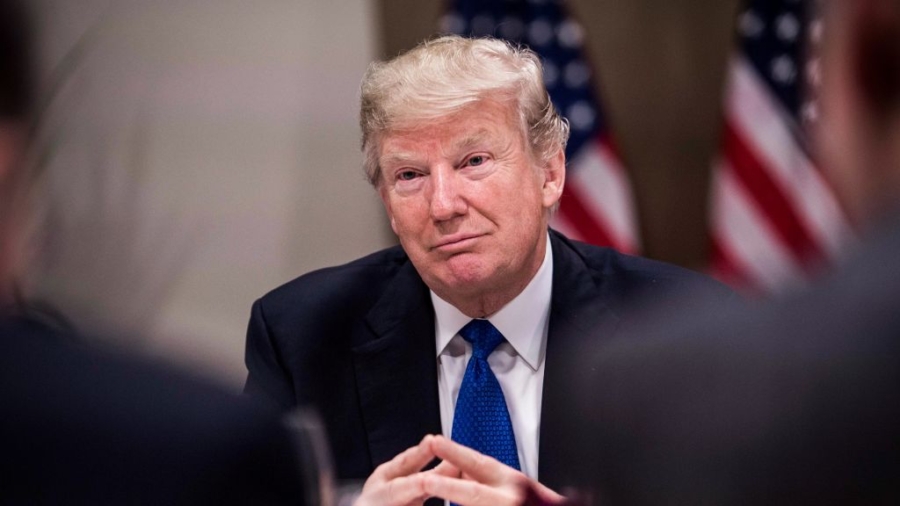DAVOS, Switzerland—President Donald Trump, this week, is expected to attend the World Economic Forum (WEF), a high profile summit in the Swiss mountain town of Davos that brings together world leaders, business elites, economists, and celebrities from around the globe.
Trump attended the WEF in 2018 but had to cancel his trip last year due to a record-long partial government shutdown.
The economic summit in the Alpine town will run from Jan. 21 through Jan. 24 this year, marking its 50th anniversary. As in previous years, the forum will focus on current economic and social issues to help shape global, regional, and industry agendas.
Trump is scheduled to attend the summit Jan. 21-22. He will deliver a speech on the event’s opening day, a few hours before his impeachment trial is expected to begin in the Senate on Jan 21.
This will be Trump’s second visit to the annual gathering. He is expected to use his Davos speech as an opportunity to hail his trade and economic victories.
Similar to his 2018 speech, Trump is poised to highlight his tax reform and regulatory rollback to deliver a message to investors that “America is open for business.”
“We want those business leaders all to come to the United States,” he told reporters on Jan 16 at the White House. “We have tremendous, powerful room for growth.”
Amid the global slowdown, the U.S. economy defied recession fears last year and entered the longest expansion in American history. The United States is expected to be the only one of the Group of Seven countries that will post growth above 2 percent in 2019, according to economists.
Meanwhile, the global economy recorded its slowest expansion in the past decade, according to the International Monetary Fund. Trade tensions, poor business climate, and country-specific weaknesses in emerging markets were a significant drag on global growth last year.
In 2018, Trump pitched his America First agenda in Davos, telling global elites that the United States would “no longer turn a blind eye” to unfair trade practices.
“We cannot have free and open trade if some countries exploit the system at the expense of others,” Trump said in his first Davos speech.
At this year’s event, however, he is expected to take a softer tone on trade and protectionism as he signed the initial trade deal with China last week. In addition, the Senate passed on Jan. 16 the United States-Mexico-Canada Agreement, paving the way for its ratification.
“He’s got a great message to deliver there in Davos,” Kellyanne Conway, a top adviser to Trump told reporters on Jan. 16.
She said Trump was likely to “take on the perils of socialism” and address several issues, including the stock market, the global economy, and whether NATO members are meeting their defense spending requirements.
Key Theme: Climate Change
Each year’s forum has a theme, and this year’s meeting will focus on the concept of “stakeholders for a sustainable and cohesive world.”
Political and business leaders will tackle climate and environmental threats during the summit. As last year, Greta Thunberg, the 17-year-old Swedish climate activist is expected to attend the forum and ramp up pressure on businesses and governments.
The leaders will also address other pressing issues, according to the WEF, such as income inequality, long-term debt burden, technology war, rising geopolitical conflicts, and workforce development.
Augustine Faucher, deputy chief economist at Pittsburgh based PNC Bank said that the main issue that needs addressing in Davos is the slowing global trade flows, which have had negative impact on the global economy recently.
“I do think that greater trade flows over the long run contribute to broad-based global economic growth,” he told The Epoch Times. “So I would like to see a recommitment to openness to global trade. And that includes tariff barriers, includes non-tariff barriers, includes treatment of intellectual property, all sorts of those issues that need to be addressed.”
Nearly 3,000 people, including leaders from G20 countries, company executives, and other prominent figures are expected to attend this year’s gathering.
The list of attendees also includes leaders from Iraq, Jordan, the Palestinian Authority, Pakistan, and Afghanistan. Iran’s Foreign Minister Mohamad Javad Zarif who was originally scheduled to attend the forum, canceled his trip, according to the WEF.
“We have to understand the cancellation from Iran foreign minister Zarif against the backdrop of uncertainty in the region and what is unfolding in Iran,” Borge Brende, WEF president, said at a press conference last week.
The U.S. delegation attending the Davos summit this year includes Treasury Secretary Steven Mnuchin, Commerce Secretary Wilbur Ross, White House advisers Ivanka Trump and Jared Kushner, and other top officials.
Trump will host a dinner for business leaders and conduct a series of bilateral meetings during the summit.

